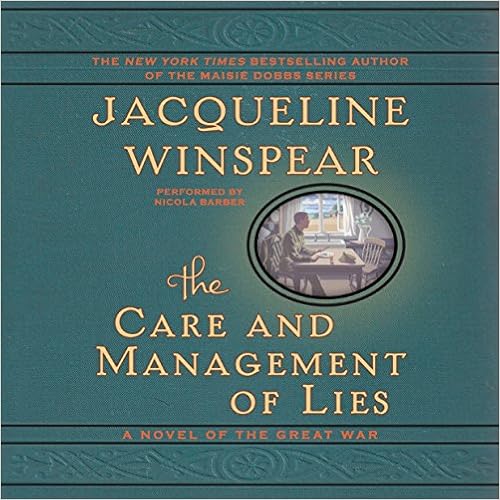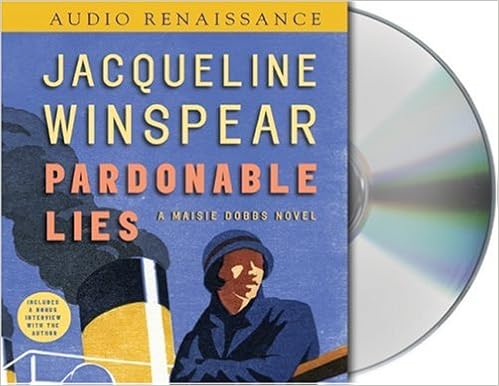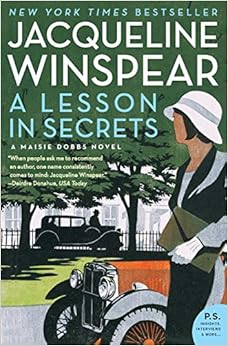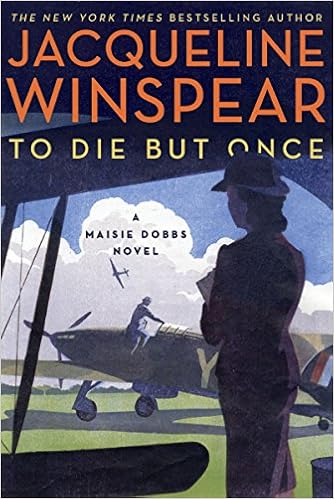
The Mapping of Love and Death (Maisie Dobbs, Book 7)
Hardcover – March 23, 2010
Description
Alexander McCall Smith Talks with Jacqueline Winspear Alexander McCall Smith : Characters, once created, have a way of staying on. Maisie is an attractive character--when did she say to you: "I want a series?" Jacqueline Winspear : As I was writing the first novel in the series, Maisie Dobbs , I realized that scenes and ideas were coming to me that were not part of the book. I started keeping notes on those other scenes, passages of dialogue and so on, and when I had finished Maisie Dobbs , I went through those notes and realized I had rough plans for another five or six books. Indeed, as I was writing the second book in the series, Birds of a Feather , I really had to push any thoughts of the intended third novel from my mind, so strong were the images for Pardonable Lies that kept popping into my mind's eye. I had to be very disciplined not to be distracted by those images--it was rather like being nagged by one's own characters. Smith : Maisie Dobbs is firmly placed in the past. Would you be comfortable writing about contemporary Britain? Winspear : That’s a very good question, and indeed, I have a more contemporary novel on the proverbial "back-burner."xa0 However, although I visit my parents in Sussex many several times each year, for me there is a certain detachment from everyday life in the UK. I am not as familiar with various aspects of life there, so it might be difficult to get that ring of authenticity.xa0 On the other hand, one could argue that the lack of transparency could act in my favor, because I now take notice of so many things that might have passed me by.xa0 I believe one of the reasons I am so comfortable writing about the past is that when I was a child we lived in a small hamlet with very few children, so it was a world of adults, many of them elderly, and all of them ready to tell a story of their own youth. I have always been drawn to the past through family history, a curiosity that has its roots in my grandfather's experience in the Great War--he was wounded and shell-shocked at the Battle of the Somme in 1916. Even as a very young child I understood the extent of his suffering and struggled to fathom how something so terrible could happen to a beloved grandparent.xa0 And I am sure my interest in the women of that generation--the first generation of women to go to war in modern times--is rooted in memories of the ladies of a certain age who lived in our neighborhood as I was growing up. They were typical of that generation, very independent women who had remained single due to circumstance, for the men they might have married had been lost to war.So, to the question of writing about contemporary Britain--I think I'll find out more about my level of comfort with modern times when I pull that contemporary novel off the back burner. In the meantime, there's so much that I want to explore from the past, though when I immerse myself in the preparatory research for my books, I am always reminded of the old adage: "history repeats itself." Smith : You and I both started as novelists rather later than is perhaps usual. Is that a good thing or a bad thing? Winspear : When I was sixteen I rather precociously announced that I would write my first novel by the time I was thirty--it seemed such a formidable age of adulthood, I suppose. Of course, thirty came and went with no novel to show for it, and in the meantime I was becoming more and more interested in nonfiction writing.xa0 I was in my late thirties by the time I made a real commitment to getting my work published, and I concentrated more on essays, articles and other creative nonfiction. I believe my writing at that time represented something of an apprenticeship in that I was really working at the craft of writing, of building my understanding of framing a scene, of bringing the reader along with metaphor, and with developing scenes that were something like the literary equivalent of a zoom lens on the camera; I was trying to find out what worked in terms of drawing the reader in and placing them at the center of the action. Though I had no plans to write a novel until the idea for Maisie Dobbs actually came to me, upon reflection it seems as if I had been preparing for the task with my literary cross-training in the same way that an athlete prepares for the big event.xa0 I believe the journey to becoming a writer is one that is very personal to the individual and is neither good or bad--it's just what it is. There are times when I think it would have been so much more fun to have started writing fiction earlier, but had that happened, the stars might not have aligned to bring the character of Maisie Dobbs into my life.xa0 And I think that in embarking upon being novelists in our middle years, we’ve probably both brought something to our work that we might not have been able to offer in younger days, either due to other responsibilities, or simply who we were at the time (though having said that, I am sure your readers wish the wonderful Precious Ramotswe had been created many years before you decided to write The No 1 Ladies' Detective Agency !) Smith : Have you written anything about Maisie that you would like to unwrite? Winspear : No, not at all, although I should add that I have never gone back and re-read any of my books, a prospect I find rather daunting.xa0 Of course, I dip back into the books to check a point here and there, but I have never read the books from beginning to end--if I had done so, I might have a whole list of things that cause me to shudder. Smith : Do you think that transplanting oneself--in your case from the UK to California--helps one as a writer? Winspear : Another very good question!xa0 Many years ago, during a visit to New York, I went along to an exhibit at the main branch of the New York Public Library on Fifth Avenue--it was called "Writers in Exile."xa0 The focus was on writers who lived in a place other than the land of their birth, "by will, or by compunction." I spent ages going around the exhibit taking copious notes, and remember it left me with a real sense of the power of being transplanted, whether by one’s own choice, or by circumstance; and I have to say, I often think of it when people ask me if being here in California contributes to my work as a writer--and it does. To give an example, I can immerse myself in the time and place about which I write--Britain from the Great War on up to the 1930s--and I am not distracted by British life as it is today. Yes, of course, there is contemporary life here in California, but it is different (the way people speak, interact, shop, travel, work, etc.) so I can draw a firm line between life here and the world about which I write.xa0 I should confess that one of my recent challenges came when I started writing The Mapping of Love and Death . The opening is set in California in 1914, so I had to ensure that my knowledge of that region today did not seep into the story. To that end I immersed myself in old books about the region, and managed to procure some vintage photographs to pin on the wall so that the past was very much with me as I wrote.When I write, the time and place of my imagination becomes very distilled, very sharp in my mind's eye. In terms of the series featuring Maisie Dobbs, it has definitely helped to be living here; when I sit down at my desk to write, I step from my world into her world, and I’m aware of nothing else until I stop writing.xa0 And when I drag myself back from a morning spent in the smog-enveloped London of the 1930s, it's not bad to be able to walk outside into the garden and warm my bones in the California sun for a while. From Publishers Weekly Set in 1932, bestseller Winspear's endearing seventh Maisie Dobbs novel (after 2009's Among the Mad ) centers on Michael Clifton, a young American cartographer during the Great War, whose remains turn up in a French field. Evidence suggests to Maisie that Michael, rather than dying in a shell blast, was murdered. Michael's parents arrive in London with letters from an unnamed English nurse that raise disturbing questions about the nurse's relationship with their son. The plucky inquiry agent embarks on a search for this woman, following a trail that leads to Chatham, home of the School of Military Engineering, which Michael attended. There she learns about the vital role that cartography played in the war. At times, subplots involving socialite James Compton, a frustrated suitor, and the family problems of Maisie's assistant, Billy Beale, slow the pace. As often in this winning series, the action builds to a somewhat sad if satisfying conclusion. 10-city author tour. (Apr.) Copyright © Reed Business Information, a division of Reed Elsevier Inc. All rights reserved. From Bookmarks Magazine Compared to Agatha Christie and Dorothy L. Sayers in both style and tone, Winspear has crafted yet another fascinating installment to her best-selling series, combining a clever assessment of the social, cultural, and economic turmoil of 1930s Europe with a tidy and entertaining mystery. However, Winspear's melancholy voice, vivid descriptions of Depression-era London, and war-haunted characters add just the right amount of gloom to keep modern readers turning the pages. Winspear focuses nearly as much on Maisie's personal life and social circle as she does on the mounting body count, but most critics thought that the momentum and suspense don't suffer as a result. Though the Washington Times carped about Winspear's prose style, Maisie's followers will delight in her new adventure. From Booklist The sixth Maisie Dobbs mystery, set in England between the wars, is based on a true story about the discovery of a collapsed dugout from World War I containing the bodies of a cartography team and their equipment. The American parents of the dead cartographer hire Maisie to find “the English Nurse,” the young man’s mysterious lover—and possibly his killer, as the autopsy evidence points to his having been murdered shortly before the dugout collapsed. Only a few hours after having hired Maisie, the Americans are attacked and badly beaten, prompting Maisie to take it upon herself to discover their attacker. Maisie and her assistant, Billy, take on the case in their usual careful and contemplative style, even as difficulties in Maisie’s personal life challenge her concentration. Readers who preferred the earlier novels in the series will be pleased with this entry and those waiting for Maisie to finally find a love interest will have something to cheer about. A must read for series fans, especially because the ending hints that big changes are on the way for Maisie. --Jessica Moyer “Compelling.” — People (3 ½ out of 4 stars) “In Maisie Dobbs, Jacqueline Winspear has given us a real gift. Maisie Dobbs has not been created—she has been discovered. Such people are always there amongst us, waiting for somebody like Ms. Winspear to come along and reveal them. And what a revelation it is!” — Alexander McCall Smith “An engaging plot coupled with captivating character makes this the best Dobbs novel to date.” — Library Journal “Endearing. . . . As often in this winning series, the action builds to a somewhat sad if satisfying conclusion.” — Publishers Weekly (starred review) “When people ask me to recommend an author, one name consistently comes to mind: Jacqueline Winspear.” — Deirdre Donahue, USA Today “A sleuth to treasure.” — Marilyn Stasio, New York Times Book Review “A detective series to savor.” — Johanna McGeary, Time “[Catches] the sorrow of a lost generation in the character of one exceptional woman.” — Dick Adler, Chicago Tribune “What charms most is Dobbs herself: a woman ‘not as adept in her personal life as she was in her professional domain,’ and all the more engaging for that.” — Tom Nolan, Wall Street Journal In the latest mystery in the New York Times bestselling series, Maisie Dobbs must unravel a case of wartime love and death—an investigation that leads her to a long-hidden affair between a young cartographer and a mysterious nurse. August 1914. Michael Clifton is mapping the land he has just purchased in California's beautiful Santa Ynez Valley, certain that oil lies beneath its surface. But as the young cartographer prepares to return home to Boston, war is declared in Europe. Michael—the youngest son of an expatriate Englishman—puts duty first and sails for his father's native country to serve in the British army. Three years later, he is listed among those missing in action. April 1932. London psychologist and investigator Maisie Dobbs is retained by Michael's parents, who have recently learned that their son's remains have been unearthed in France. They want Maisie to find the unnamed nurse whose love letters were among Michael's belongings—a quest that takes Maisie back to her own bittersweet wartime love. Her inquiries, and the stunning discovery that Michael Clifton was murdered in his trench, unleash a web of intrigue and violence that threatens to engulf the soldier's family and even Maisie herself. Over the course of her investigation, Maisie must cope with the approaching loss of her mentor, Maurice Blanche, and her growing awareness that she is once again falling in love. Following the critically acclaimed bestseller Among the Mad , The Mapping of Love and Death delivers the most gripping and satisfying chapter yet in the life of Maisie Dobbs. Jacqueline Winspear is the author of the New York Times bestsellers The Consequences of Fear, The American Agent , and To Die but Once , as well as thirteen other bestselling Maisie Dobbs novels and The Care and Management of Lies , a Dayton Literary Peace Prize finalist. Jacqueline has also published two nonfiction books, What Would Maisie Do? and a memoir, This Time Next Year We’ll Be Laughing .xa0Originally from the United Kingdom, she divides her time between California and the Pacific Northwest. Read more
Features & Highlights
- “Jacqueline Winspear chronicles the uncharted, sometimes rocky path chosen by her protagonist and delivers results that are educational, unique and wonderful.” —
- USA Today
- “Maisie Dobbs is a revelation.” — Alexander McCall Smith, author of
- The No. 1 Ladies Detective Agency
- From Jacqueline Winspear,
- New York Times
- bestselling author of
- Among the Mad
- and
- An Incomplete Revenge
- , comes another thrilling installment in the Maisie Dobbs series. In
- The Mapping of Love and Death
- , Winspear’s popular “psychologist and investigator” Maisie Dobbs is hired to unravel a case of wartime love and death, an investigation that leads her to a doomed affair between a young cartographer and a mysterious nurse.





